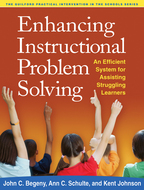Enhancing Instructional Problem Solving
An Efficient System for Assisting Struggling Learners
John C. Begeny, Ann C. Schulte, and Kent Johnson
This title is part of The Guilford Practical Intervention in the Schools Series, edited by Sandra M. Chafouleas.
“What district or school couldn't utilize a research-based, user-friendly book that strengthens their response-to-intervention process? The clear, step-by-step plan outlined in this book can enhance any school's capacity to improve student learning outcomes. Complete with specific procedures and resources, this unique guide will serve as a roadmap for district- and school-level educators as they struggle with the reality of addressing the learning needs of all students.”
—Kathy Durbin, PhD, Student Services Director, Lancaster County (South Carolina) School District
“Helping schools to implement systemwide change to improve student academic performance can be exhilarating, but practitioners often face deeply frustrating obstacles. This is absolutely the best book I have come across as a map for successfully navigating and mastering the difficult process of schoolwide change. The book provides guidance for promoting a problem-solving approach throughout the school to improve every classroom teacher's day-to-day instructional practices. The authors offer valuable recommendations for training teachers to serve as intervention consultants; assessing academic delays and monitoring student progress; and making efficient use of personnel and school resources.”
—Jim Wright, MS, CAS, RTI consultant and trainer, New York
Table of Contents
I. Preparing for Implementation1. Introduction to the Systems-Oriented Plan for Academic Achievement
2. SOPAA Key Definitions, History, Components, and Roles
3. Preliminary Considerations for SOPAA Implementation
II. The Six SOPAA Components
4. Initial Steps of the TAPS Process: Requests for Academic Support and Preparation for the Intervention Planning Meeting
5. Secondary Steps of the TAPS Process: Intervention Planning, Follow-Ups, and Summative Reviews of Intervention Effectiveness
6. Assessment for Instruction
7. Maximizing Implementation through Targeted Professional Development
8. Maximizing Intervention Delivery through Recruiting and Training School Volunteers
9. Obtaining Support for the SOPAA through Effective Communication with School Leaders
10. Obtaining and Sustaining Support for the SOPAA through Effective Communication with Teachers
11. Using the SOPAA with Multidisciplinary Co-Facilitators
III. Additional Information and Guidance
12. Evidence-Based and Learner-Verified Intervention Programs in Reading, Mathematics, and Writing
13. Case Illustrations of SOPAA Implementation
14. Using the SOPAA to Support Graduate Students’ Training and Applied Experiences in Schools
Epilogue
Appendices
About the Authors
John C. Begeny, PhD, is Associate Professor in the School Psychology Program at North Carolina State University and a psychologist in North Carolina. He was awarded the Ernest A. Lynton Citation for Distinguished Engaged Scholarship. Dr. Begeny's research interests include academic consultation, methods to improve children’s reading abilities, international education, and strategies to narrow the gap between research and practice in education.Ann C. Schulte, PhD, is Professor in the Department of Psychology at North Carolina State University. She serves on the editorial boards of multiple journals, including Journal of School Psychology, School Psychology Review, and Learning Disabilities Research & Practice. Dr. Schulte's research focuses on school-based services for children with disabilities and improvement of achievement outcomes for this population.
Kent Johnson, PhD, is Founder and Executive Director of Morningside Academy, a laboratory school in Seattle, Washington. Morningside Academy investigates effective curriculum materials and teaching methods, and has provided training and consulting in instruction to over 125 schools and agencies in the United States and Canada. Dr. Johnson has published many articles and books on research-based curriculum and teaching methods.
